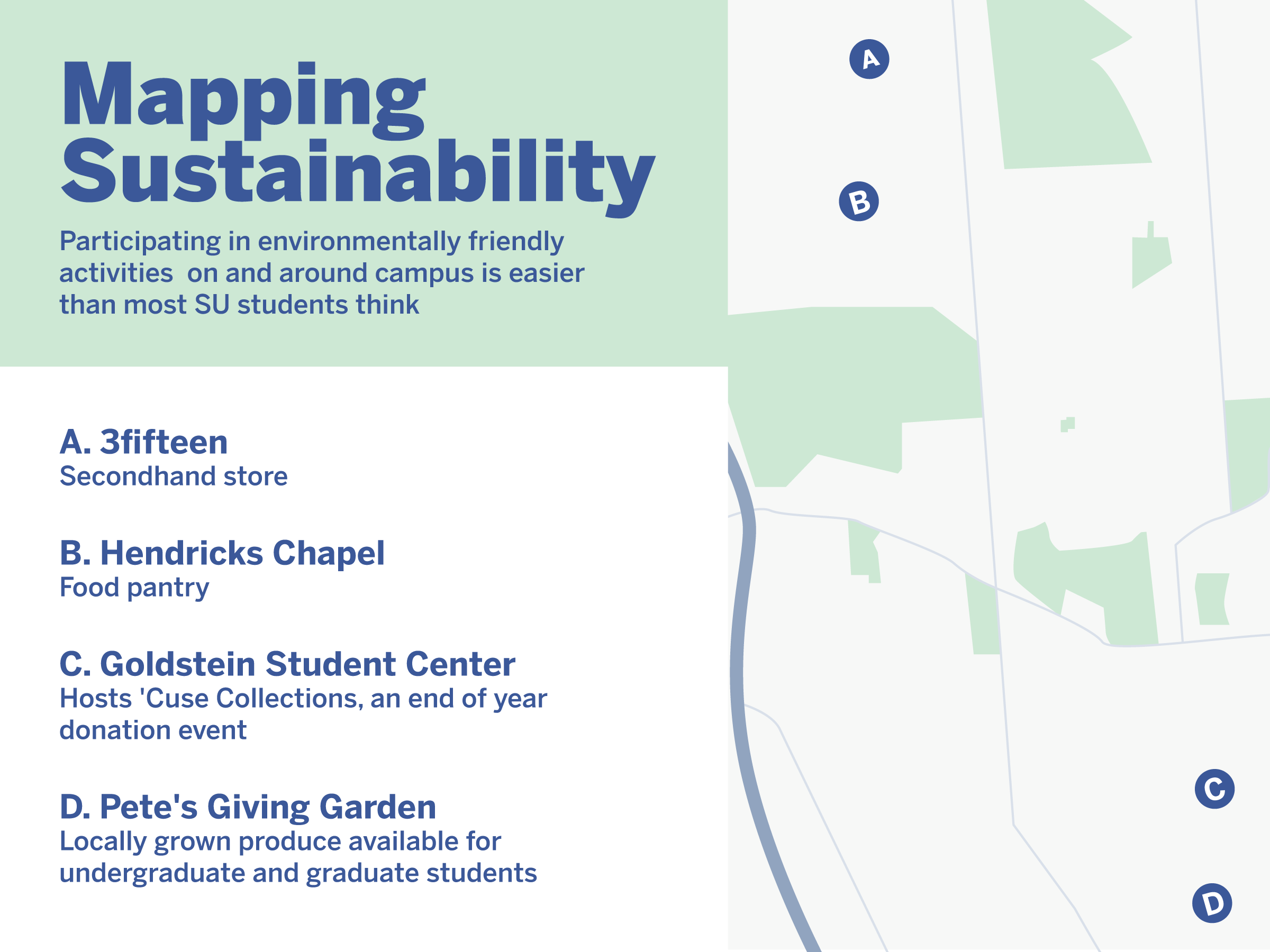Get the latest Syracuse news delivered right to your inbox.
Subscribe to our newsletter here.
I found my passion for environmental conservation after interviewing a representative in Austin, Texas’ Environmental Department for my capstone project in high school. Fascinated by the environmental policymaking I learned about, I gained a sense of hope for sustainability efforts.
Now, I’m a sophomore majoring in environment, sustainability and policy interning with the Syracuse University Office of Sustainability Management this semester. On Dec. 1, I worked with Sustainability Management to conduct a food waste audit during lunch hours. We recorded 48.8 pounds of food waste from 11:30 a.m. to 1 p.m. in Shaw Dining Hall.
While collecting data, I talked to my co-worker Sophia Darsch, a senior at SU, and project manager Lydia Knox from the Office of Campus Planning, Design and Construction about the common rhetoric we see surrounding sustainability. We all came to the same conclusion that relentless pessimism can often deter people from taking action.
The media constantly bombards us with “climate doomism:” polarizing and actionless statements, such as “we’re all going to die in a few years” and “no consumption under capitalism is ethical,” that do little but scare us.
“I think one of the biggest problems with sustainable messaging is that it promotes an unfeasible ‘all or nothing’ mentality,” Darsch wrote in a message to me.
The push for climate action shouldn’t have to revolve around the narrative that the world as we know it is over. We can work to create a culture around sustainability that takes small steps to produce larger impacts over time. Reinforcing this narrative is a big part of Sustainability Management’s goal and they do this by implementing initiatives on campus.
Sustainability Management offers student internships for credit, pay or capstone classes. The office is home to the South Campus food pantry, which is available for all students with no questions asked. As a part of the initiative, undergraduate and graduate students can take one bag of groceries per week and choose their items themselves. The produce in the pantry is from Pete’s Giving Garden, a small garden that is accessible to all students and is located near Skyhall.

Cindy Zhang| Digital Design Director
At the end of each semester the office also puts on ’Cuse Collection, a donation drive for non-perishable food, bedding and household items during semester move-outs where students can donate what they no longer need. These items are all sent to charities like the Boys and Girls Club of Syracuse.
Yet, a lack of knowledge of these programs has made it difficult for them to be as successful as they could.
In spring 2023, the Office of Sustainability Management conducted a survey to evaluate the awareness of their services on campus among faculty and students. The survey was intended to increase knowledge of sustainability on campus as a part of SU’s path toward achieving carbon neutrality by 2032 in the 2023 Climate Action Plan.
Only 26 percent of survey participants answered that they were familiar with Sustainability Management as an initiative on campus.
Confusion regarding sustainability as a whole has impacted campus culture and action. One question on the survey asked was, “Do any of the following cause you to not participate in sustainable practices as much as you would like to on campus?”
Thirty-nine percent selected the answer choice: “lack of awareness/knowledge of sustainable practices.” Thirty percent chose “lack of time” and 24 percent selected “too many mixed messages/confused on what to do.”
Rather than letting climate doomism discourage us, we must, as a campus, resist this pessimism and make change despite it. Taking sustainable action can be overwhelming, but if we all take small steps we can begin to create a larger impact.
“We need to encourage people to care, relate, and act in a way that doesn’t cause them to put the whole world on their shoulders, but makes them excited to make positive changes,” Darsch wrote.
Sarah Csobaji is a sophomore Environment, Sustainability and Policy and Political Science major. She can be reached at [email protected].
Published on December 5, 2023 at 1:24 am

